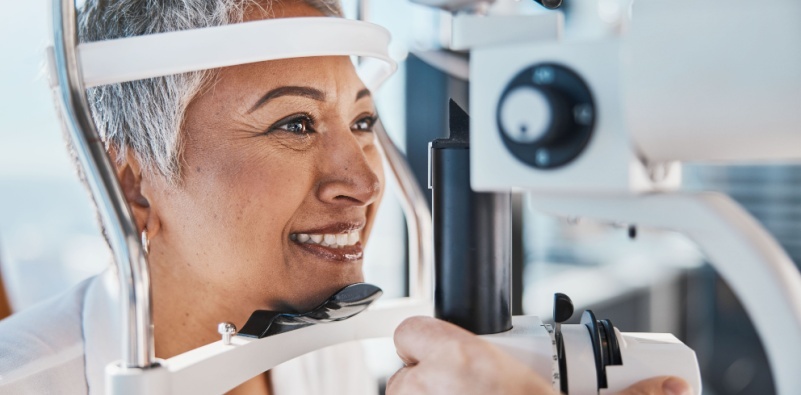Maintain healthy eyes as you age
As we journey through life, our eyes naturally undergo changes. Many of us will experience some deterioration in our eyesight, beginning as early as our 40s. While this is all part of the ageing process, understanding what is happening and how to stay on top of your eye health will help you maintain clear vision and, ultimately, your quality of life.
We’ll explore common eye conditions that can occur due to age and provide practical guidance on how to protect your sight for years to come.
Common age-related vision conditions
Age-related vision conditions include:
Presbyopia
Presbyopia is essentially the eye’s version of grey hair. It’s practically inevitable as you age, typically emerging in your 40s. It makes it difficult to focus on close-up objects like books or smartphones.
The science behind presbyopia is straightforward: the lens in your eye gradually becomes less flexible, like a camera struggling to focus properly for close-up shots. You might find yourself holding a menu, book or screen at arm’s length to see them clearly, experiencing headaches after reading, or needing brighter light to see clearly.
Cataracts
More than 50% of us will experience cataracts by the age of 80. This occurs when the lens in your eye becomes cloudy, like looking through a foggy window.
Cataracts happen when proteins in the lens break down and clump together over time. Early symptoms include blurred vision, difficulty seeing at night, light sensitivity, seeing halos around lights, and faded colour perception. While cataracts develop slowly, they can significantly impact vision, affecting everyday activities like driving safely if left untreated.
Age-related macular degeneration (AMD)
AMD is the leading cause of vision loss in people over 60 and is irreversible. It damages the macula – the central part of the retina responsible for sharp, detailed vision.
There are two types:
Dry AMD is the more common form (90% of cases), where light-sensitive cells in the macula gradually break down. It typically progresses slowly over the years without obvious symptoms.
Wet AMD is less common but more severe. Abnormal blood vessels grow under the retina and leak fluid and blood, causing rapid vision loss.
General symptoms once the condition has advanced include blurred central vision, difficulty recognising faces, straight lines appearing wavy, and needing brighter light for reading.
Glaucoma
Glaucoma typically develops without early warning signs. It’s caused by increased pressure within the eye, which damages the optic nerve.
Most common in people over 60, glaucoma primarily affects peripheral vision. Risk factors include family history of the condition, high blood pressure, and diabetes. Because symptoms only tend to appear once glaucoma has already progressed, regular eye exams are crucial for early detection.
How to protect your vision
There are several steps you can take to safeguard your eyesight.
Regular trips to the opticians are your first line of defence. Eye tests can catch conditions like glaucoma, AMD, and cataracts before they cause real damage to your vision. For those over 40, an eye exam every two years is usually recommended. If you’re over 60 or have risk factors like diabetes or a family history of eye disease, our optometrists will likely recommend annual tests.
During an eye exam, your optician will examine the health of your eyes in detail, as well as check for any changes in prescription. Our advanced retinal imaging techniques, like the OCT and Optomap, can pinpoint the exact location of any issues and diagnose them well before symptoms appear, potentially saving your sight.
For presbyopia, reading glasses are the most commonly prescribed solution, but there are more versatile choices available. Bifocals combine two prescriptions in one lens, with a visible line separating them. Varifocals, on the other hand, smoothly transition between near, intermediate and distance vision without a visible line on the glasses, making vision feel more natural and allowing convenience with one pair for everything. Meanwhile, multifocal contact lenses work like varifocals. Our friendly experts are here to help you find the perfect choice for your lifestyle and vision needs.
Did you know your diet plays a role in your eye health? Antioxidants, vitamins, and minerals can help protect against age-related eye conditions, as does maintaining a healthy weight.
Stock up on the following foods to help boost eye health:
- leafy greens such as kale and spinach contain lutein and zeaxanthin, which help prevent macular degeneration
- oily fish, rich in omega-3 fatty acids to support retinal health
- citrus fruits and other vitamin C-rich foods to help maintain healthy blood vessels in the eye
- nuts and seeds for vitamin E that protects cells from damage
Beyond diet, staying active helps maintain healthy blood flow to the eyes, while quitting smoking will reduce your risk for cataracts, AMD, and other eye conditions.
Sunglasses aren’t just a fashion statement; they’re also essential eye protection. Excessive UV exposure over the years contributes to cataracts and macular degeneration. When shopping for sunglasses, look for:
- 100% UV protection (both UVA and UVB)
- wraparound styles that block light from the sides
- polarised lenses if you spend time near water or driving
Even on grey days, UV rays penetrate cloud cover, so make sunglasses a year-round habit. For additional protection, particularly during peak sunlight hours, pair your sunglasses with a wide-brimmed hat.
Take control of your eye health
Understanding age-related eye conditions empowers you to take proactive steps for healthy eyes. While we can’t stop the ageing process, we can certainly adapt to it and implement protective measures that preserve our eyesight.
Remember that early detection and treatment of eye conditions can prevent or slow vision loss. Something as simple as updating your prescription or making dietary changes could significantly improve your quality of life.
Don’t wait until vision problems interfere with daily activities. If you’ve noticed changes in your sight or haven’t had an eye exam recently, now is the perfect time to take action.
Book an eye exam at one of our opticians in Potters Bar, Finchley & Temple Fortune today for a comprehensive assessment.
